In seiner Schrift ›De deo Socratis‹ stellt Apuleius in rhetorisch geschliffener Form mittelplatonische Vorstellungen von Göttern und Menschen und der zwischen ihnen vermittelnden Potenzen (der sogenannten ›Dämonen‹) dar, denen Apuleius' Hauptaugenmerk gilt; Sokrates wird dabei zu seinem Kronzeugen, wie einem tugendhaft und philosophisch lebenden Menschen Fürsorge und Schutz eines solchen Dämons zuteil wird. Die Schrift – die für Heiden aber auch für Christen maßgebliche religiöse Vorstellungen des 2. Jh. nach Christus vermittelt – endet dementsprechend mit einem werbenden Aufruf an die Menschen, sich wie Sokrates um die echte Bildung des eigenen Geistes zu kümmern.
Aktualisiert: 2023-06-02
> findR *
Die Beiträge zur Altertumskunde enthalten Monographien, Sammelbände, Editionen, Übersetzungen und Kommentare zu Themen aus den Bereichen Klassische, Mittel- und Neulateinische Philologie, Alte Geschichte, Archäologie, Antike Philosophie sowie Nachwirken der Antike bis in die Neuzeit. Dadurch leistet die Reihe einen umfassenden Beitrag zur Erschließung klassischer Literatur und zur Forschung im gesamten Gebiet der Altertumswissenschaften.
Aktualisiert: 2023-05-29
> findR *
Die Beiträge zur Altertumskunde enthalten Monographien, Sammelbände, Editionen, Übersetzungen und Kommentare zu Themen aus den Bereichen Klassische, Mittel- und Neulateinische Philologie, Alte Geschichte, Archäologie, Antike Philosophie sowie Nachwirken der Antike bis in die Neuzeit. Dadurch leistet die Reihe einen umfassenden Beitrag zur Erschließung klassischer Literatur und zur Forschung im gesamten Gebiet der Altertumswissenschaften.
Aktualisiert: 2023-05-29
> findR *
Aktualisiert: 2023-05-29
> findR *
Aktualisiert: 2023-05-29
> findR *
In seiner Schrift ›De deo Socratis‹ stellt Apuleius in rhetorisch geschliffener Form mittelplatonische Vorstellungen von Göttern und Menschen und der zwischen ihnen vermittelnden Potenzen (der sogenannten ›Dämonen‹) dar, denen Apuleius' Hauptaugenmerk gilt; Sokrates wird dabei zu seinem Kronzeugen, wie einem tugendhaft und philosophisch lebenden Menschen Fürsorge und Schutz eines solchen Dämons zuteil wird. Die Schrift – die für Heiden aber auch für Christen maßgebliche religiöse Vorstellungen des 2. Jh. nach Christus vermittelt – endet dementsprechend mit einem werbenden Aufruf an die Menschen, sich wie Sokrates um die echte Bildung des eigenen Geistes zu kümmern.
Aktualisiert: 2023-05-11
> findR *
In seiner Schrift ›De deo Socratis‹ stellt Apuleius in rhetorisch geschliffener Form mittelplatonische Vorstellungen von Göttern und Menschen und der zwischen ihnen vermittelnden Potenzen (der sogenannten ›Dämonen‹) dar, denen Apuleius' Hauptaugenmerk gilt; Sokrates wird dabei zu seinem Kronzeugen, wie einem tugendhaft und philosophisch lebenden Menschen Fürsorge und Schutz eines solchen Dämons zuteil wird. Die Schrift – die für Heiden aber auch für Christen maßgebliche religiöse Vorstellungen des 2. Jh. nach Christus vermittelt – endet dementsprechend mit einem werbenden Aufruf an die Menschen, sich wie Sokrates um die echte Bildung des eigenen Geistes zu kümmern.
Aktualisiert: 2023-05-11
> findR *
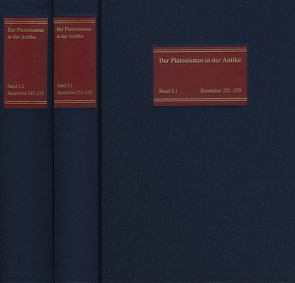
Mit der ›Ethik‹ wird die systematische Darstellung der Inhalte und Themen des kaiserzeitlichen Platonismus abgeschlossen. Sie ist in dieser Form nicht nur ein Desiderat der Platonismus-Forschung, sondern wird auch dem wachsenden Interesse gerecht, das inner- und außerhalb der Fachwissenschaft ethischen Fragestellungen entgegengebracht wird. Zahlreiche international renommierte Fachgelehrte stellen in 20 Bausteinen alle wesentlichen Aspekte der platonischen Ethik vor. Dabei sollen einerseits die systematische Verortung der einzelnen ethischen Problemfelder im Rahmen der platonischen Ethik insgesamt, andererseits die historische Genese der platonischen Lösungen und ihre Einbindung in ihren geistesgeschichtlichen Kontext dargestellt werden.
The ›Ethik‹ (Ethics) concludes the systematic presentation of the content and themes of Platonism in imperial times. In this form it is not only a desideratum of research on Platonism but also satisfies the growing interest shown in questions of ethics within and outside of this academic discipline. Numerous internationally renowned scholars present all the fundamental aspects of Plato’s ethics in 20 key elements. Their goal is to show the systemic context of the individual ethical problem areas within the framework of Plato’s ethics as a whole on the one hand and on the other hand to show the historical genesis of Platonic solutions and their incorporation in their context in the history of thought.
Aktualisiert: 2020-07-31
Autor:
Michele Abbate,
Matthias Baltes,
Mauro Bonazzi,
Wolfram Brinker,
John Dillon,
Heinrich Doerrie,
Friedemann Drews,
Michael Erler,
Franco Ferrari,
Christoph Helmig,
Filip Karfik,
Benedikt Krämer,
Alessandro Linguiti,
Irmgard Männlein-Robert,
Martin Menze,
Walter Mesch,
Jörn Müller,
Philipp Nölker,
Dominic J. O’Meara,
Matthias Perkams,
Federico Maria Petrucci,
Christian Pietsch,
Andrew Smith,
Benedikt Strobel,
Christian Tornau
In seiner Schrift ›De deo Socratis‹ stellt Apuleius in rhetorisch geschliffener Form mittelplatonische Vorstellungen von Göttern und Menschen und der zwischen ihnen vermittelnden Potenzen (der sogenannten ›Dämonen‹) dar, denen Apuleius' Hauptaugenmerk gilt; Sokrates wird dabei zu seinem Kronzeugen, wie einem tugendhaft und philosophisch lebenden Menschen Fürsorge und Schutz eines solchen Dämons zuteil wird. Die Schrift – die für Heiden aber auch für Christen maßgebliche religiöse Vorstellungen des 2. Jh. nach Christus vermittelt – endet dementsprechend mit einem werbenden Aufruf an die Menschen, sich wie Sokrates um die echte Bildung des eigenen Geistes zu kümmern.
Aktualisiert: 2023-03-31
> findR *
Aktualisiert: 2023-03-27
> findR *
Aktualisiert: 2023-03-27
> findR *
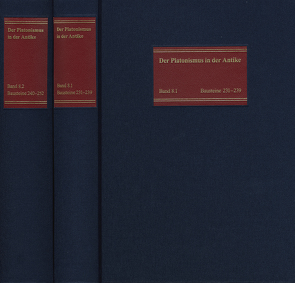
The ›Ethik‹ (Ethics) concludes the systematic presentation of the content and themes of Platonism in imperial times. In this form it is not only a desideratum of research on Platonism but also satisfies the growing interest shown in questions of ethics within and outside of this academic discipline. Numerous internationally renowned scholars present all the fundamental aspects of Plato’s ethics in 20 key elements. Their goal is to show the systemic context of the individual ethical problem areas within the framework of Plato’s ethics as a whole on the one hand and on the other hand to show the historical genesis of Platonic solutions and their incorporation in their context in the history of thought.
Aktualisiert: 2021-03-18
Autor:
Michele Abbate,
Matthias Baltes,
Mauro Bonazzi,
Wolfram Brinker,
John Dillon,
Heinrich Doerrie,
Friedemann Drews,
Michael Erler,
Franco Ferrari,
Christoph Helmig,
Filip Karfik,
Benedikt Krämer,
Alessandro Linguiti,
Irmgard Männlein-Robert,
Martin Menze,
Walter Mesch,
Jörn Müller,
Philipp Nölker,
Dominic J. O’Meara,
Matthias Perkams,
Federico Maria Petrucci,
Christian Pietsch,
Andrew Smith,
Benedikt Strobel,
Christian Tornau
Volume 2 examines the interest which Plato and his teachings aroused outside the Academy during the Hellenistic Period. The annotated source material reports criticism and praise, rejection and recognition of Plato. It also describes the first endeavors of ancient grammarians to compile the Corpus Platonicum as well as the efforts to see Plato (like Pythagoras before him) as a herald of eastern wisdom and thought.
Aktualisiert: 2023-03-14
> findR *
Volume three deals with the conditions under which the Platonic philosophers were living in the 2nd and 3rd centuries AD and focuses on the assistance they received from the cities and the emperor, public tributes, the way in which they were judged by outsiders and the decline of Platonism in the 3rd century AD. Furthermore, the way in which others dealt with Plato‹s writings is discussed. This includes commentaries on Plato‹s dialogues, complete overviews of his teachings, monographs on controversial issues or lexicons of terms he used.
Aktualisiert: 2023-03-14
> findR *
This volume traces the external and internal history of the Academy Plato‹s school, up to the time of Cicero (and up until its official closing in 529 AD) and focuses on the question of how much was known of the teachings of Plato and his followers in the 1st century BC, i.e. what were the foundations of knowledge which formed the basis of Platonism as it emerged during the early imperial period. Dörrie comes to the conclusion that "the tradition established by Plato had suffered several breaks.» As a consequence, Platonism of the imperial period did not have its origins in the Academy but instead had to be newly established outside it.
Aktualisiert: 2023-03-14
> findR *
This volume examines three extremely important problems of ancient Platonism: the theory of forms (125-135), the theory of the origin of the world (136-145) and the theory of the elements (146-150). Dealing as it does in its first section with Platonic principles, this volume is linked directly to the fourth volume. In discussing the theory of the origin of the world and of the elements, it also forges a link to the sixth volume, which will deal with the soul.
Aktualisiert: 2023-03-14
> findR *
Following the description of the external history in Volumes 1-3, the teachings of Platonism are presented in the subsequent volumes. The fourth volume begins by dealing with some fundamental postulates. It questions the definition, the purpose and the classifications of philosophy (101-102) and then deals with the different types of being and non-being, their gradation and their acquisition by diairesis (103-106). It concludes with a presentation of the bond that ties it all together (107-110), based on Plato‹s analogy of the sun and the divided line, the Analogia entis, "the analogy of being.»(107-110). The volume deals subsequently with natural philosophy and its principles (111-122) followed by an in-depth study of matter, (123-124), one of these principles.
Aktualisiert: 2019-06-27
> findR *
Volume seven deals with Plato‹s theology, establishing the goal, center and as it were the keystone of theocentric Platonic philosophy. The following subjects are dealt with systematically: in the first volume of the set doxographical information on Plato‹s theology (182-183), Platonists‹ discussions of other theologies (184-187), Platonic definitions of the deity (188), the problem of recognizing and talking about God (189-192), characteristics of the gods (193-194), types or categories of gods (195-199), the highest God (200-204), place and dealings of the gods (205-206). The second volume of the set is linked to theology with a »downward» spiral of intermediate beings (demons, nymphs, angels, heroes) (207-213). It concludes with the levels of soul (214-230) which are examined in their diverse forms and studied on the basis of the impact and their methods of approaching the divine.
Aktualisiert: 2023-03-14
> findR *
Die Beiträge zur Altertumskunde enthalten Monographien, Sammelbände, Editionen, Übersetzungen und Kommentare zu Themen aus den Bereichen Klassische, Mittel- und Neulateinische Philologie, Alte Geschichte, Archäologie, Antike Philosophie sowie Nachwirken der Antike bis in die Neuzeit. Dadurch leistet die Reihe einen umfassenden Beitrag zur Erschließung klassischer Literatur und zur Forschung im gesamten Gebiet der Altertumswissenschaften.
Aktualisiert: 2023-03-27
> findR *
The theory of the soul was a matter on which philosophers focused particularly, since it showed them their own position within reality as well as their specific potential and goals. Thus the theory of the soul provides the psychological and epistemological prerequisites for Platonic theology and metaphysics (see Volume 7) as well as for ethics (see Volume 8). The individual problems dealt with include the definition and nature of the soul (151-158), origin and types of soul (159-163), parts and powers of the soul (164-170), preexistence, incorporation and freedom of the soul, its fate after death and the theory of transmigration. (171-180).
Aktualisiert: 2023-03-14
> findR *
MEHR ANZEIGEN
Bücher von Baltes, Matthias
Sie suchen ein Buch oder Publikation vonBaltes, Matthias ? Bei Buch findr finden Sie alle Bücher Baltes, Matthias.
Entdecken Sie neue Bücher oder Klassiker für Sie selbst oder zum Verschenken. Buch findr hat zahlreiche Bücher
von Baltes, Matthias im Sortiment. Nehmen Sie sich Zeit zum Stöbern und finden Sie das passende Buch oder die
Publiketion für Ihr Lesevergnügen oder Ihr Interessensgebiet. Stöbern Sie durch unser Angebot und finden Sie aus
unserer großen Auswahl das Buch, das Ihnen zusagt. Bei Buch findr finden Sie Romane, Ratgeber, wissenschaftliche und
populärwissenschaftliche Bücher uvm. Bestellen Sie Ihr Buch zu Ihrem Thema einfach online und lassen Sie es sich
bequem nach Hause schicken. Wir wünschen Ihnen schöne und entspannte Lesemomente mit Ihrem Buch
von Baltes, Matthias .
Baltes, Matthias - Große Auswahl an Publikationen bei Buch findr
Bei uns finden Sie Bücher aller beliebter Autoren, Neuerscheinungen, Bestseller genauso wie alte Schätze. Bücher
von Baltes, Matthias die Ihre Fantasie anregen und Bücher, die Sie weiterbilden und Ihnen wissenschaftliche Fakten
vermitteln. Ganz nach Ihrem Geschmack ist das passende Buch für Sie dabei. Finden Sie eine große Auswahl Bücher
verschiedenster Genres, Verlage, Schlagworte Genre bei Buchfindr:
Unser Repertoire umfasst Bücher von
- Balteschwiler, Martin und Regula
- Balthasar, A.
- Balthasar, Alexander
- Balthasar, Alexandra
- Balthasar, Andreas
- Balthasar, Cord
- Balthasar, Désirée
- Balthasar, H U von
- Balthasar, Hans K von
- Balthasar, Hans U von
Sie haben viele Möglichkeiten bei Buch findr die passenden Bücher für Ihr Lesevergnügen zu entdecken. Nutzen Sie
unsere Suchfunktionen, um zu stöbern und für Sie interessante Bücher in den unterschiedlichen Genres und Kategorien
zu finden. Neben Büchern von Baltes, Matthias und Büchern aus verschiedenen Kategorien finden Sie schnell und
einfach auch eine Auflistung thematisch passender Publikationen. Probieren Sie es aus, legen Sie jetzt los! Ihrem
Lesevergnügen steht nichts im Wege. Nutzen Sie die Vorteile Ihre Bücher online zu kaufen und bekommen Sie die
bestellten Bücher schnell und bequem zugestellt. Nehmen Sie sich die Zeit, online die Bücher Ihrer Wahl anzulesen,
Buchempfehlungen und Rezensionen zu studieren, Informationen zu Autoren zu lesen. Viel Spaß beim Lesen wünscht Ihnen
das Team von Buchfindr.












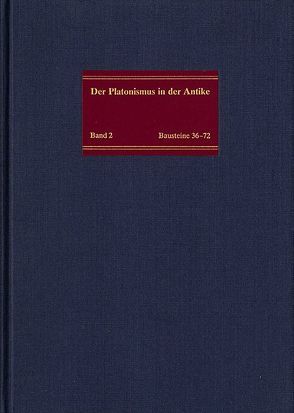
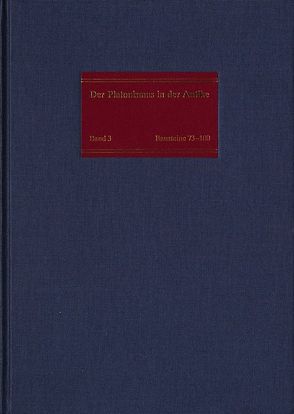
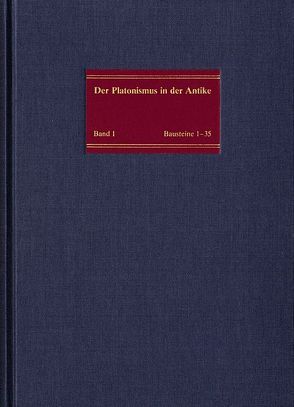
![Die philosophische Lehre des Platonismus [2] von Baltes, Matthias, Doerrie, Heinrich, Pietsch, Christian](https://buch-findr.de/media/der-platonismus-in-der-antike-grundlagen-system-entwicklung-die-philosophische-lehre-des-platonismus-1_9783772811579_295.jpg)
![Die philosophische Lehre des Platonismus [1] von Baltes, Matthias, Doerrie, Heinrich, Pietsch, Christian](https://buch-findr.de/media/der-platonismus-in-der-antike-grundlagen-system-entwicklung-die-philosophische-lehre-des-platonismus_9783772811562_295.jpg)
![Die philosophische Lehre des Platonismus [4] von Baltes, Matthias, Doerrie, Heinrich, Lakmann, Marie L, Pietsch, Christian](https://buch-findr.de/media/die-philosophische-lehre-des-platonismus-4_9783772811593_295.jpg)

![Die philosophische Lehre des Platonismus [3] von Baltes, Matthias, Doerrie, Heinrich, Pietsch, Christian](https://buch-findr.de/media/die-philosophische-lehre-des-platonismus-3_9783772811586_295.jpg)